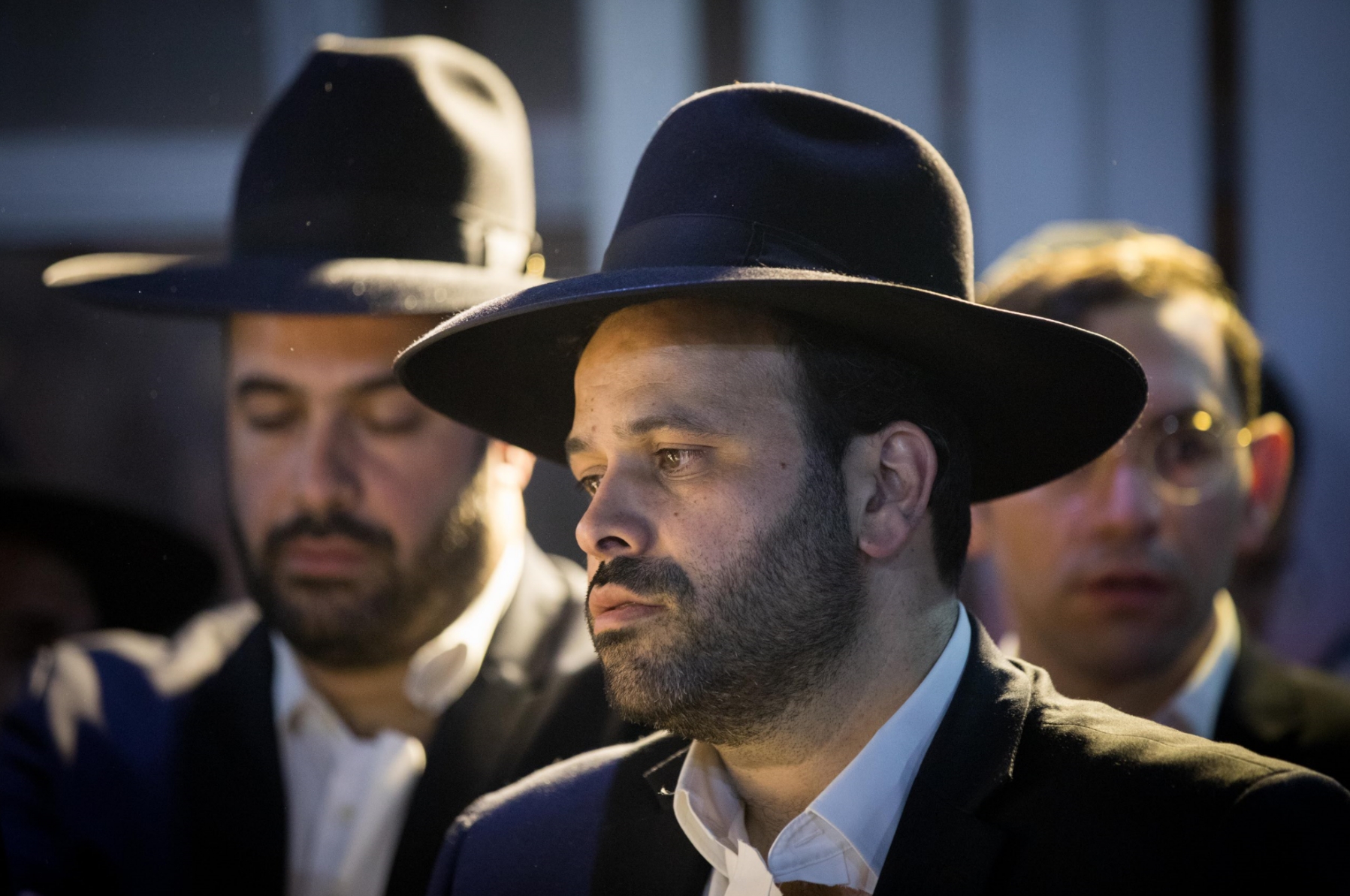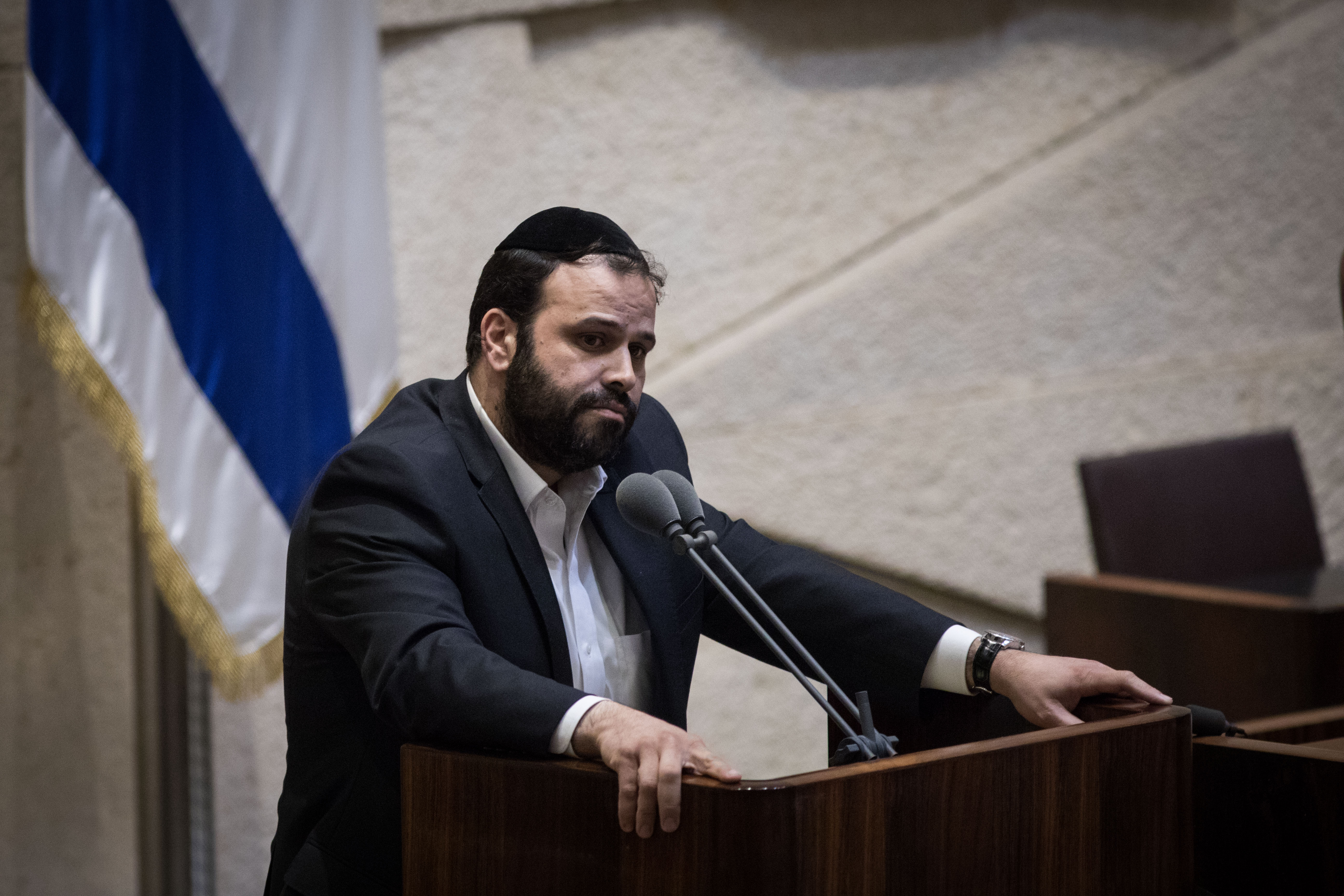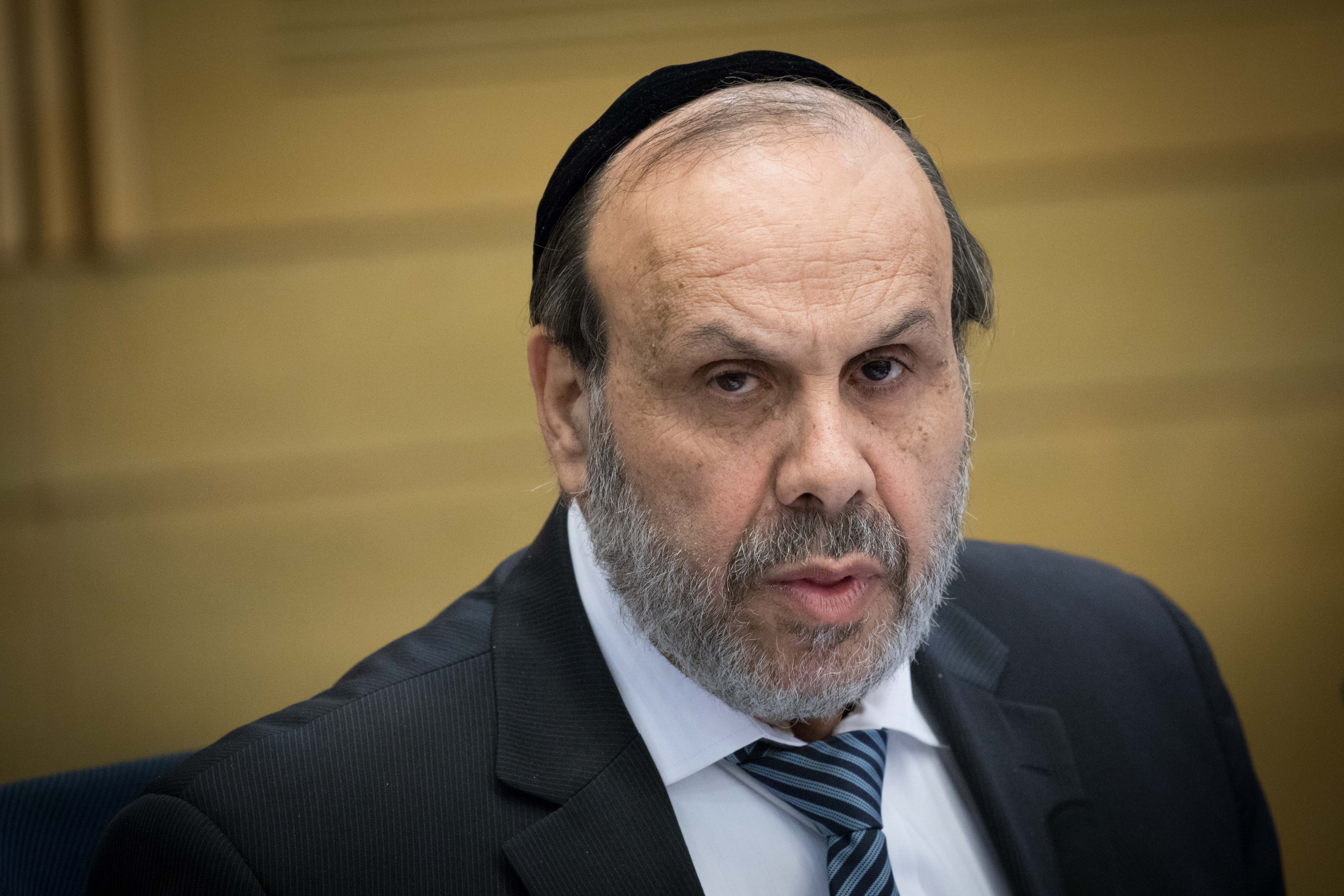MK Yinon Azoulay: "My Late Father Insisted No Politics at the Shabbat Table"
About a month ago, Minister of Religious Services David Azoulay, of blessed memory, passed away after battling a serious illness. He left behind an unwritten will: to work for the ordinary citizen. On the 30th day since his passing, his son MK Yinon Azoulay shares about his father's character.
 MK Yinon Azoulay (Photo: Flash 90)
MK Yinon Azoulay (Photo: Flash 90)"When we would return from treatments at the hospital, my father would ask to hear the song 'The Good for His Compassion Has Not Ended.' He used to say that we must thank Hashem for everything," shares MK Yinon Azoulay this week in an interview with the Hidabroot website, marking the 30th day since the passing of his father, the Minister of Religious Services, David Azoulay, of blessed memory. Minister Azoulay passed away after battling a serious illness. His son shares: "He was a man of faith. He didn't complain. He didn't ask: 'Why did this happen to me?' We were amazed at how he dealt with the illness. Only after my father passed did I understand the kindness Hashem did. I always thought that if my father recovered, it would be a great sanctification of God's name. But in my father's passing, there was a great sanctification of God's name. Then, his good deeds were revealed, his humility, simplicity, and modesty—this was my father."
MK Azoulay (39), lives in Ashdod and is a father of five. He was sworn in as a Knesset member from the Shas party about eight months ago. As he stepped down from the podium, after being sworn in, his late father blessed him. "Father placed both his hands on my head and blessed me," he recalls, "Today, Father looks at me from above—and I feel his two hands. With Hashem's help, you will continue to be proud of me from above as well." MK Azoulay is the third of four children of the late David and Pnina. He is the only one who follows in his father's public footsteps: "The truth is that my father didn't push me to enter politics; he often tried to steer me away from it. Since I was already involved in public activities, that was his comfort and pride."
"Torah Study Comes First"
"Being a member of the Knesset is a public burden and a lot of responsibility," explains Azoulay. "I come from a house of action, and I continue in it even now. My agenda is full and busy. Indeed, being a member of Knesset is a position of power, which should be used for the benefit of the citizen who has no way to reach higher levels. If a sanctification of God's name is made from this place - that's the greatest satisfaction there is." According to him, his wife supports his activities: "The moment the position was assigned to me by the President of the Council of Torah Sages, Rabbi Shalom Cohen, and he decided that this is what is good and right—she accepts it easily. When there is a Torah opinion and you follow it—there are no doubts." Azoulay is a relatively young Knesset member: "Everyone in the Knesset needs the other, and the truth is that most Knesset members come there to work."
 (Photo: Flash 90)
(Photo: Flash 90)"In the media, the criticism is that we extend each other. Eventually, everyone talks to everyone afterward. The relationship is of equals. When you come from a place to help, and politics is not the focus—everyone loves you. I am part of this trend. Besides, you need to be able to separate ideological differences from friendship. In general, you can and even need to remain friends despite ideological differences. The boundary is clear—if there is harm to Israel's sanctities or Israel's leaders—then there is no friendship. If someone harms something dear to me, there's no reason to be their friend behind the plenum. Overall, most Knesset members are good activists. Of course, everywhere there are margins, but in my view, our explanations to the public as Knesset members are lacking. We have a problem in explanation. Factually, not all the positive things reach the media and get prominence."
Fifty-four years ago, David Azoulay was born in the city of Meknes, Morocco, the son of Massoud and Perla, and he was descended from the Chida (Rabbi Chaim Yosef David Azoulay, a halachic authority and kabbalist). When he was nine, his family immigrated to Israel and settled in the town of Rechasim near Kiryat Ata. Over the years, Azoulay was orphaned by his father. He studied at the "Chazon Yehezkel" teacher's seminar, worked as a teacher in Acre (where he lived), and also managed a school of independent education in the city. He worked in education until 1993.
Before entering the national political arena, the late Azoulay served as a member of the Acre city council for three terms. Among other things, he was responsible for welfare services and served on the management of the city's community center network. In 1996, he was elected to the Knesset for the first time, and from the fourteenth Knesset, he served continuously as a Knesset member for about 22 years, until the twentieth Knesset in 2018. About eight months ago, due to the worsening of his condition, he resigned from the Knesset under the Norwegian law, and his son Yinon, who was placed sixteenth on the Shas list in the twentieth Knesset elections, took his place. He continued to serve as Minister of Religious Services until October 12th. About a month ago, he passed away, leaving behind a wife, four children, and many citizens who remember his public service, modesty, and big heart.
"A True Public Figure and a Model Family Man"
MK Azoulay grew up and was educated in Acre, in a Charedi home where the parents, the late David and Pnina, taught their children that Torah study is the supreme value and takes precedence over everything. "Father’s message was: First of all, be men of the Torah," says MK Azoulay. "I studied in a Torah Talmud and then in a small and large yeshiva. After I got married, I studied about 14 years in a kollel. At the same time, I was involved in public activities informally. People would come to me with requests. Everyone knew that my father was a Knesset member. When they needed help—they saw me as an address. My father would joke and say we should open a public inquiry office for me."
 (Photo: Flash 90)
(Photo: Flash 90)As a child, he looked up to his father with admiration: "Father was a true public envoy. Alongside his public work, he was a prominent family man. Even when we were young, he did not neglect the house. He would tell us a bedtime story, check homework, and assist in our studies. When we studied in yeshivas, he would visit; actually, there wasn’t a week he didn't miss a visit. When approached, he didn’t know what it meant not to respond. Although he didn’t promise success, he did promise 100% effort."
In one case MK Azoulay witnessed, he received a lesson in public service. "I was a yeshiva student," he recalls, "Close to midnight, a woman knocked at our door, asking to speak with Father. Father had just returned from work at the Knesset, so I asked if it wasn’t urgent to make the request tomorrow. When Father heard the woman wanted to talk to him, he first invited her inside. He then prepared her a drink and listened to her distress. After she left, he told me: 'True, it wasn’t urgent, but if she came here at this hour, it probably weighed on her. It bothered her. She wanted to unburden her heart.' Father continued and explained to me: 'The people holding high positions will come to you. It’s your responsibility to approach ordinary citizens.' This was a lesson in public service. In fact, Father entered local and national politics to make a difference. He didn't seek a position; he wanted to contribute."
"Father was a special person, a person everyone loved. He didn’t pride himself on anyone. Even when he reached senior positions, he didn’t elevate himself. He always remembered he was in politics to make a difference, especially for the ordinary citizen. He had a special sensitivity to prisoners. He knew when a prisoner called, he needed to answer because perhaps they wouldn't have a chance to call again. He performed charity in secret, which nobody knew about. Only when we sat shiva and comforters arrived did we learn things. For example, we found out that in the past, a woman who betrothed her son feared that the match would break because she didn’t have the pledged money. Father told her not to worry, that she should commit, and he would help her. It turned out he gave her his private checks through which she met her obligation. The couple got married, and they had children who today are students."
He remembers his father's sensitivity even from the days when he was a yeshiva student: "Father bought us suits but ensured we were sensitive to others, look around us, and see if there was a needy yeshiva student who couldn’t afford a new suit. If so, we would buy him a new suit as well. We studied in Sephardi yeshivas, and Father was proud of his origin and the culture he came from. At Shabbat meals, we sang Sephardi Shabbat songs. He fought to accept girls into seminaries who were not accepted just because of their origin. He was caring, a person of small deeds that made others feel good."
A Will Engraved in Heart and Soul
One key thing that the late Minister Azoulay insisted on was the arranging of the Shabbat table: "All week, Father cared for the needs of Shabbat. He was the one who set the Shabbat table, even during his illness. He would also arrange the Shabbat candles and insisted that not a single word about politics be uttered at the Shabbat table. Heaven forbid if it happened; Father would be angry."
According to MK Azoulay, as Minister of Religious Services, his father’s aspirations were to improve the employment conditions of the mikveh attendants, separate the payment of kashrut supervisors from the business owners, among others: "Father always said it wasn't acceptable to tell people they are working in holy service, and the synonym for that would be 'volunteering.' He had a vision that, unfortunately, was cut short."
 MK David Azoulay, z
MK David Azoulay, zAbout 13 years ago, Minister Azoulay fell ill for the first time: "He recovered, and about a year ago, the illness returned," recalls his son, "It was hard on us. He was the one who strengthened us. My mother is very strong in faith, but the void is very difficult. As a family, we strive to support each other. Many people ask if Father left a written will. I answer that Father didn’t leave a written will; he left a will engraved in heart and soul, engraved in his way. This means to sanctify God's name, continue with the work, care for our mother, and our grandmother. It was important to him that we remain united, be there for each other, without competition—that’s how we grew up. His spiritual will is the path he bequeathed. He united and brought us together."
MK Azoulay intends to continue in his father’s path: "I want to be seen as an address, so people know the Knesset is not an unreachable place. I will strive to promote laws that can help and raise socially significant topics on the agenda. It is customary to say that the one who is full does not feel the hunger of the hungry, but we are here definitely to care for others. On the night I was sworn into the Knesset, Father told me: 'Don’t forget the ordinary citizen, the small citizen.' After all, we are here for them, to help them."

